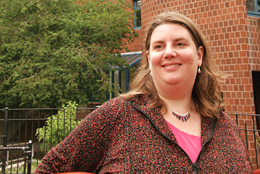Dental School Gets $14.5 Million for Disparities Research
SDM’s largest grant will fund early childhood intervention

The Goldman School of Dental Medicine has received a $14.5 million grant — the largest award in the school’s history and among the 10 largest at the Boston University Medical Campus — to continue its efforts to reduce oral diseases among at-risk low-income children.
The grant, awarded to SDM’s Center for Research to Evaluate and Eliminate Dental Disparities (CREEDD) by the National Institute of Dental and Craniofacial Research and the National Center on Minority Health and Health Disparities, will provide funding for the center’s research and outreach projects until 2015.
“We are trying to develop models of community-based interventions to actually prevent dental decay in children,” says Michelle Henshaw, an SDM professor and assistant dean for community partnerships and extramural affairs and one of two principal investigators on the grant. “And we’re excited at the opportunity the award gives us in translating the work we do into improving the oral health of children. That’s really the end point here. It’s not about laboratory research; it’s really community-based research where we’re trying to make a real difference in their health and their quality of life.”
The center, founded in 2001 with an earlier NIDCR/NCMHHD grant, aims to reduce dental decay — a chronic childhood disease in Massachusetts that is prevalent in children from low-income families and in racial and ethnic minority groups.
CREEDD research has found that nearly 20,000 Massachusetts kindergartners show signs of dental decay; half of them go without treatment. The center works with local health centers and conducts interventions to introduce and promote the concepts of good oral hygiene and regular dental care in at-risk communities.
“Dental disease can happen as early as six months to a year of age,” Henshaw says. “At two years of age, that’s when we see the most children having problems, because getting a two-year-old to the dentist is sometimes challenging for parents. We’re trying to go where the kids are, developing interventions and raising awareness in populations that are at high risk for having children with dental disease. We hope to get them to their first visit with the dentist by the time they are one year of age.”
The grant will fund two primary community-based intervention research projects: a partnership with community health centers for counseling and fluoride treatments and an advocacy project in public housing, where trained peer health advocates will add oral health promotion to their ongoing education efforts. The public housing advocacy project will take place in Boston, and the community health center partnership projects will be implemented in Boston, Maryland, and Ohio.
Raul Garcia, an SDM professor and chair of health policy and health services research, is the other principal investigator on the project.
“This award is a clear validation of our team’s success over the past seven years,” Garcia says.
Jessica Ullian can be reached at jullian@bu.edu. Kimberly Cornuelle can be reached at kcornuel@bu.edu.
Comments & Discussion
Boston University moderates comments to facilitate an informed, substantive, civil conversation. Abusive, profane, self-promotional, misleading, incoherent or off-topic comments will be rejected. Moderators are staffed during regular business hours (EST) and can only accept comments written in English. Statistics or facts must include a citation or a link to the citation.